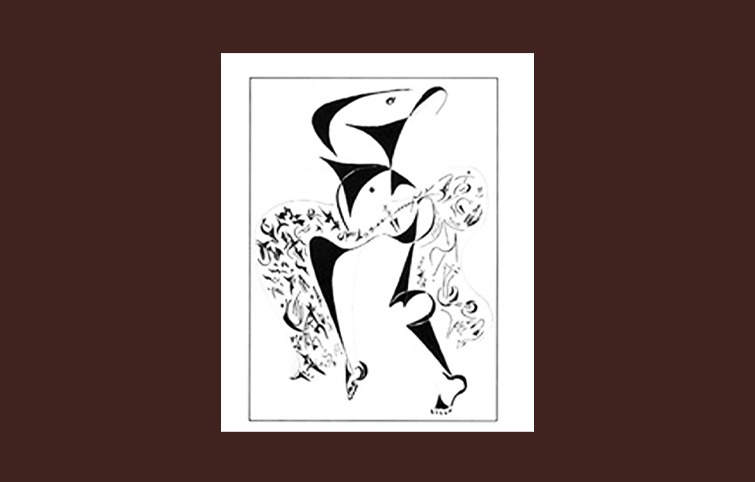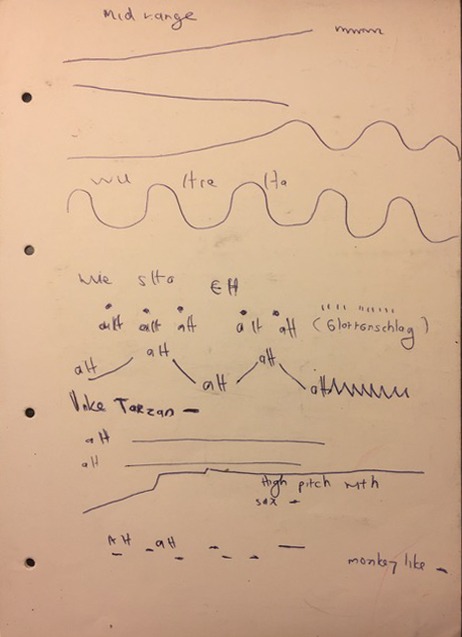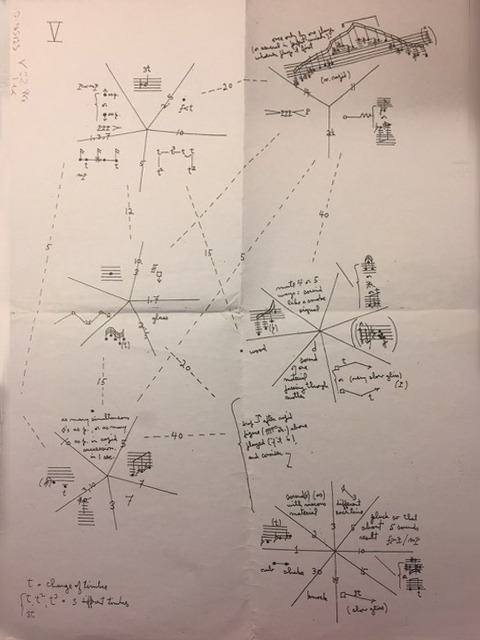JULIANA VENTER
Feedback
What would happen if we decolonize music? Composer Neo Muyanga points out in his editorial when and how do we differentiate our music? How do we differentiate ourselves from western rules? In my opinion one could also then ask how does western civilization stand as it does today without centuries of influences from others. Neo Muyanga talks about south Sotho words; for singing ´ho bina´ – meaning making a sound with your mouth. Why not use the symbol of a mouth and go into detail of how you want to use it, make drawings.

In Setswana,´ho bina´means to dance, to move your body. `ho opela` in Setswana means to sing, ´ho bina´in Sesotho. Also, ´ho opela´ in Sesotho means clap hands. This is so beautiful and evocative that I think South African composers should invent their own notation, based on exactly these expressions.

But the idea of decolonizing music and not using western notation especially when you are for example learning classical music or Opera, sounds like an impractical plan. In my opinion notation is just a series of work systems. Notation as modern composers such as John Cage and Iannis Xenakis or Stockhausen and many others have shown us can be anything. A system is helpful and it also creates the possibility of storing something longer than just the lifetime of a cd or an app, or a cloud, otherwise where do we store our work, our memories and ideas and how do we share them ?

When I am trying to write a score for the experimental sounds I make with my mouth, I draw zigzags and lines and dots and signs no one else will understand. And very few musicians can read a John Cage score. I think it is a matter of just doing your own thing and owning it.

We have all borrowed from each other, even jazz music from the USA has taken from Ravel and the impressionists certain chord structures. It is not only as I often used to argue that white people stole from jazz, they all stole from one another. And big rock bands like Led Zeppelin and the Rolling stones have taken from and been influenced by the blues from the USA. Howlin’ Wolf I am certain inspired Captain Beefheart. Big Mama Thornton certainly inspired many female blues singers such as Janis Joplin.

Indian music and ragas and Arabic music mostly comes from an oral tradition and a tradition being handed down from father to son or being a student of a master meant sitting with the master and listening and playing for hours until the music is in your blood. For me this is some of the most complex and beautiful music I have ever heard.
The Griot tradition in Mauritania which is one I have studied and performed myself comes from storytelling. And they are very closed about this tradition, not just anybody is allowed to sing and perform this music. One of my all time favorite singers the great Dimi Mint Abba was a grand singer of the griot tradition. Yet I dare to study it for myself and get inspired.
The violation in my opinion does not happen in influence or sharing or learning form one another, the negative thing that happens is when we steal. That in itself is a broad term, but it is a negative outcome, when we suffocate one group’s culture and describe it as primitive because it does not fall into western rules and traditions. Without mutual recognition and respect we are lost. Sounds almost naïve, these words recognition and respect. But they are not as simple as they sound it seems.
An example of this came to me when I was reading about Ghenghis Khan the Great Emperor of the Mongol Empire (1162- August 18, 1227). I always believed that Guttenberg found the first printing press but it was under Ghenghis Kahn in China that the first printing press was invented. It was through the silk roads and trade that civilization came to Europe. Under Ghenghis Khan’s empire all religions were allowed, and in his government sat Persians and Arabs and Turks and Chinese and many more. His only rule was that one religion and culture not oppress or rule the other.
When the Mongolians came in touch with the Europeans, it was a rather uncivilized society they stumbled upon, controlled by the church. Hygiene was almost non- existent. We have been told a distorted version of History, yet still I would not diminish everything European. How does one ignore the greatness of Bach? Bach who was inspired by Franz von Biber an experimental violin virtuoso (1600-1700).
I quote Norwegian Saxophonist Rolf-Erik Nystrøm from his latest release The Oriental Winds of the Baroque. “It is said Biber did something people later stopped doing in classical music, but it is quite common in folk music in Norway, West Africa and central Asia, namely to retune string instruments (scordatura) to create different moods. Biber picked this up from folk music and travelers he met in Austria. These people mostly came from the east, through Hungary, who in turn had contact with people from the Ottoman Empire. There is a relationship between art, music and folk music in the popular suite form of time. Each of these dances, for example bouree, sarabande, gavotte, gigue can be traced back to folk music from other parts of the world. Ciacconna and sarabande are said to have originated in the Spanish colonies in Latin America in the 1500s and came back to Europe as sexy dances, something that caused them to be forbidden by the church. This of course made the dances even more popular and the nobility included them in their festivities. We can therefore say that the perhaps most “European” of all composers J.S. Bach, wrote Latin American-inspired music.
The possibility of an even earlier inspiration for the ciacconna, the Moors. “The Moors of al – Andalus, Ziryab and Baroque music. Etymologically the word orient comes from east/rising´” In the beginning it was used for the Italian Peninsulas east Coast. Around 600 AD this would shift to the City of Rome. Any area below the City of Rome was considered the Orient, as well as the ethnicities inhabiting the land, such as Dalmatian Italians (modern Neopolitans, along with Sicilians, Tunisians, Moroccans, Greeks, etc) as well as everything east of southern Italy and North Africa” ( Edward Said: Orientalism).
The Moorish kingdom, al- Andalus, was established on the Iberian peninsula in the 700s and was only wound up in 1492 under King Ferdinand and Queen Isabella of Aragon and Castile. What the Moors and the Arabs brought with them to Spain and Europe from north and west Africa, even from Baghdad, is surprising to most people.
Europe was seen by the Muslims as a barbaric place and being sent there in the 800s was used as punishment. Under al Andalus, laws were introduced against crime, for religious freedom – of course, without permission to mock the religion of others. Here most of the scientific and philosophical writings from old Hellas and other earlier civilisations were translated into Arabic for the first time. If one wanted to read Greek classic writing like Aristotle, in the 9th century in Europe, it would have been in Arabic.
In 1085, when king Alfonso VI entered the library in the Muslim town of Toledo, he found Muslims, Jews and Christians together tending the books, all fluent in Arab and Spanish. The Christians then translated those great works into Latin, spreading it throughout Europe. Universities, never seen in Europe before, were founded, with possibilities for even slaves and woman to study. The Arts, especially music, poetry and architecture, were cultivated, and knowledge of medicine and medical science was introduced.
A powerful testimony to the significance of travel for cultural development in Europe is the story of the Persian musician, historian, astronomer, poet, geographer and botanist Ziryab (789-857). He was sent to the Iberian peninsula as punishement after he had once outshone his music master in Baghdad and made the teacher so jealous that he gave him the choice of being executed – or banished to Europe. In al-Andalus Ziryab was allowed great freedom by the sultan, who was very enthusiastic about the songs, knowledge and words of wisdom Ziryab brought with him from far away. Here he gained more attention than others, since he was so different! He established music schools, introduced new ways of dressing, hair styles, food, introducing drinking form glass and not metal. He encouraged the use of soap, deodorant and toothpaste. Ziryab changed the culture in the region and set his mark on European music for the future.
With travel follows new discoveries and understanding, and we who call ourselves artists, and thereby story – tellers, must tell these stories when society shirks the duty. Music should really speak for itself, but as a reaction to the times we live in, where knowledge and history are given little significance in political decisions and a large section of media.
With History and time things change and new generations learn new things and often they don’t learn in depth what came before, the new disregard the old as stale and insignificant. Sometimes it is, but where we have arrived today in 2020, I almost have the feeling that in-depth knowledge is not what we will be left with. We will have lost vital knowledge in the near future if we are not careful.
As a singer and composer who grew up in an Afrikaans family under Apartheid South Africa, it is clear to me how much more we could have given each other had we not been so brutally separated. How history taught me very little about all the millions of other people living in the same country as me and how separation can make you a spiritual refugee in your own birth place.
Important composers in South Africa today such as Neo Muyanga and Carlo Mombelli and Kyle Shepherd and Cara Stacey, Matthijs Van Dijk, Mandla Mlangeni, Monthati Masebe, Gabi Motuba, Mthwakazi, Simphiwe Dana, Sho Madjozi, Nonku Phiri, Siya Makuzeni, Lungiswa Plaatjies, Nomapostile Nyiki and Thandiswa Mazwai, just to mention a few, are all shaping our current musical future or rather artistic future as are the visual artists and painters and poets and writers.
Some of these composers and musicians are creating their own styles deeply rooted in the traditional music from South Africa and other parts of Africa and the world adding their own modern style to it and creating a new type of contemporary music. This I find very exiting.